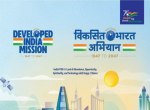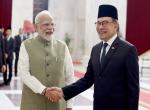Britain has a coalition government in power, with David Cameron as Prime Minister, the Conservatives as the lead party and the Liberals as the junior partner. The Deputy Prime Minister is a Liberal.
The common ground between the partners was identified in advance, there is unity in policy and any disagreement is sorted out quietly and without publicity. On such controversial issues as raising education fees, Afghanistan, the European Union, etc., the coalition has spoken as one. This is what one can call a true coalition of responsible partners, not necessarily ideologically totally like minded, but prepared to give and take, cooperate and to settle controversies in a civilised way.
India has had coalition governments after Mr. Narsimha Rao. The National Democratic Alliance (NDA), with BJP as the lead party and Atal Bihari Vajpayee as Prime Minister was in power up to 2004. Since then the United Progressive Alliance (UPA), with Congress as the lead party and Dr. Manmohan Singh, as Prime Minister, has been in power. Some of the alliance partners were common, some changed sides, while others have been consistent in their alliance. In both the NDA and UPA there have been regional partners with a high nuisance value who have held the balance of power and the lead party has had to perform a juggling act to hold the partners together. Atalji seemed to do this a little better than Manmohan Singh, but even he had to make some unforgivable compromises. In the case of UPA the motto seems to be that survival justifies all act of surrender and that to remain in power no compromise is too humiliating. This has emboldened partners such as Trinamool Congress and D.M.K to make the most outrageous demands on government, which has been only too willing to oblige. As will be demonstrated this has negated all policy planning and has made all decision making a captive to the whims and fancies of coalition partners who find that a tantrum here, a threat there works wonders and brings government to its knees. This extends even into areas of international relations. The standard excuse for pandering to the outrageous demands of the partners is that there is the compulsion of coalition. What is unsaid is that actually it is the compulsion of narrow political interests and the fear of losing power which now drives decision making in government, including acquiescence in massive corruption. As, I believe, Arun Jaitley said while paraphrasing the statement that “power corrupts and absolute power corrupts absolutely”, now the correct position is that “power corrupts and the fear of losing power corrupts absolutely”.
This paper is not so much on the compulsion of coalition as it is on trying to find out whether our policies are framed on the basis of knowledge, after weighing up various options and after taking into consideration that which is in our short term, middle-term, and long-term interest. The reasons for deviating from what is best can be many, including political compulsions, but that by itself does not explain whether any thinking at all goes into our process of decision making, especially in the matter of our relations with other countries. Our immediate neighbours with whom we have problems or with whom we should maintain good relations are Pakistan, Afghanistan, Nepal, Bangladesh, Myanmar and Sri Lanka. This list should also include Bhutan and Maldives. Going a little further we have our very large neighbour, China, to contend with and here we have serious problems about boundaries, territories, economic interests and a power struggle in South and South East Asia. Then we have Iran which is a major source of fossil fuels for us and friendship with Iran is essential for us to have a toehold in the Islamic world. The Gulf countries are important because so many Indians work there. Japan, the United States and the European Union have their own place not only in our economy but in the culture of liberalism in which India tries to live. Our interest in Africa is to compete with that of China and it is a continent which India cannot ignore. However, for each group of nations we have to evolve a policy which addresses the specifics of that nation or group and enables us to prepare an appropriate response and to create an environment in which India’s interests are well-served. How does one do this?
The normal contacts between countries are diplomatic, commercial, governmental and people to people. In this last named contact there can be problems of language, capacity to travel and entry given by foreign countries to our nationals and vice versa, in an environment of cordiality and easiness. The visa is one of the biggest hurdles in people to people contact and that is so even between immediate neighbours such as India and Pakistan. Therefore, our understanding of a country has to come through a process of intelligence collection, collation and analysis, which is why India maintains an establishment called R&AW. One of the mistaken notions is that R&AW is engaged in espionage only. A great deal of its work consists of trying to understand the country under study and for this purpose a whole set of disciplines is involved. Covert and overt espionage activities are generally engaged in where the country concerned is either hostile to India, is unfairly competitive or is likely to constitute a future threat to our national interests. R&AW has the job of conducting such espionage, just as the Intelligence Bureau is required to take counter measures against espionage conducted against India by other countries. Undoubtedly intelligence is one of the inputs which goes into policy framing, but cannot be the only one.
For a successful conduct of foreign relations we must have within government, in all the organisations which might have an impact on our foreign relations, country specific individuals or units whose sole job is to study the country in question, look at the economic trends and their effect on India, understand the psychology of the people and the rulers of that country and prepare a whole series of options for our government to adopt in its policy towards that country. There must also be parallel thinking in our universities and research institutions, which must be engaged by government to either look at specific problems which are posed to them or to carry out country specific studies which could assist government in framing policy. This was one of the tasks that the Jawaharlal Nehru University was supposed to undertake. There are many eminent scholars attached to the university who, from time to time, write in the areas of their specialisation. However, there is no evidence to indicate that these papers are of such a seminal nature that they have influenced the thinking of government. We must institutionalise the arrangement whereby, on the basis of carefully conducted research and studies, inputs come to government which would go into the framing of country specific or region specific policies. That, however, does not seem to be the case.
Let us take the case of Afghanistan. One thing is clear, the United States will have to quit that country sooner rather than later. It is a matter of some doubt whether Afghanistan is a nation state as we understand it. There is a territorial entity called Afghanistan, but history indicates that it has always been a confederation of tribes rather than a united country. The history of Afghanistan is one of an uneasy balance maintained by inter-tribal relationships, which balance is easily upset if the tribal balance or the ethnic balance is disturbed. The Mujahideen largely consisted of Pakhtuns, who are not very welcome amongst the Uzbeks, Tajiks and Hazaras who constitute the population of Northern and Western Afghanistan. The Pakthuns are the dominant tribes, but when fundamentalism in the form of the Taliban took over the government of Afghanistan, the other ethnic groups resisted this. Ultimately the direct attack on the United States on 11th September, 2001 resulted in massive retaliation by the United States against Al Qaeda and, ultimately, because the Taliban sheltered Osama Bin Laden, it brought the Taliban into direct conflict with America. The Northern Alliance was activated, in which India also played a role and ultimately the Taliban were ousted. They have made a come back and America is now determined to quit Afghanistan by 2014.
This foray into history has been made to look at the future. When America quits Afghanistan, Pakistan will certainly try and gain a stranglehold over Afghanistan and for this purpose Pakistan is hardly likely to support a Karzai type of government. That brings the fundamentalists back. India will have to deal with a situation in which as Pakistan’s influence increases in Afghanistan, India will be increasingly isolated and ousted, our development projects will close and the Indian presence will be eliminated. How do we react to this? Do we reactivate the Northern Alliance and build further bridges with the Central Asian Republics which border Afghanistan? Do we ally with Iran to rekindle a Shia movement based on the Hazaras and the city of Herat? Do we try and reach out to the Pakhtuns? One thing is certain. Pakistan will certainly use fundamentalism in Afghanistan to foment Jihad against India. A few years down the line the independent minded Afghans will probably throw out the Pakistanis and the situation may change. What do we do in the meantime? Can we consider exploitation of the fault lines in Pakistan, which would include a very clever support of separatism in Sindh and Baluchistan so that Pakistan remains embroiled in its own problems of survival? Long term thinking demands that all the scenarios should be studied in detail, informed options be compiled and government presented with a raft of options of which government can take a considered view. At present we have only ad-hocism.
Let us take the case of Nepal. This country has had a totally organic relationship with India in which our culture, language, religion, traditions and economy are closely intermeshed. Nepali citizens have all the rights of Indian citizens within India, including the right to vote. Now that the Maoists have taken over power in Nepal, though fortunately not absolute power as yet, strenuous efforts are being made to increase China’s influence and not only reduce Indian influence but, so far as is possible, to completely negate it. What is our thinking on Nepal? What are the levers available to us to counter the policy of the Maoists? How do we ensure India’s predominance in Nepal? So far no cohesive or even comprehensible policy regarding Nepal has emerged. All our actions in Nepal are totally ad hoc. Can we retain our influence in Nepal by knee-jerk reactions? The border of India with China, which should have been beyond the Himalayan ridgeline separating Nepal from Tibet/China, now threatens to move down to the Terai as Nepal drifts away from India.
This brings us to two other vital neighbours, Bangladesh and Sri Lanka. After years of hostility to India fostered by Khalida Zia and the fundamentalists, Bangladesh has moved towards democracy under Sheikh Hasina. The present Bangladesh Government is trying to curb fundamentalism and it wants to establish the friendliest relations with India. Recently the Prime Minister visited Bangladesh with the draft of a friendship treaty. One of the major components of this treaty was the sharing of the waters of the Teesta River. This is where the compulsion of coalition stepped into an area of foreign relations. Mamata Banerjee publicly said that Teesta was a West Bengal River and as the upper riparian West Bengal was not prepared to give even a drop of water to Bangladesh. Treaties with foreign countries are within the exclusive domain of the Union Government. That government is expected to consult the State Governments concerned and to address any issues which affect the States, but in the broader national interest friendship with a neighbour is more important than the riparian rights of an Indian State. Had there been a group of people working assiduously on various aspects of our relations with Bangladesh the sharing of Teesta waters and the rights of West Bengal would have been factored in when framing policy and that would have formed the basis of our policy towards Bangladesh. Obviously we have no one who does any long term thinking or planning and even the proposed treaty with Bangladesh was based on pure ad-hocism. The compulsion of keeping Mamata Banerjee mollified effectively torpedoed the treaty.
Upto 1935 Sri Lanka had administrative and political connections with India. The administrative system in Sri Lanka is very much the same as that in India and the basic ethos of government is identical. Sinhala is a Sanskrit based language and there are lakhs of Tamils of Indian origin who live in Sri Lanka. Because of Sinhala intolerance the Tamils increasingly moved towards breaking away from Sinhala majority areas and ultimately this took the form of demanding an independent Tamil State in Northern and Eastern Sri Lanka under the aegis of Liberation Tigers of Tamil Eelam (LTTE). Ultimately LTTE developed into the most powerful instrument of insurgency in the world and virtually threatened the very existence of Sri Lanka as a united country. Initially we supported the insurgency and when it threatened to spill over into Tamil Nadu, India decided on military intervention. Why we decided to send in IPKF into Sri Lanka to fight a shooting war, why we did not adopt other measures such as helping the Sri Lankans to blockade Jafna so that the supply of arms to LTTE dried up, why we did not use the Air Force and Navy to ensure that Sri Lanka did not run to other powers for help, is beyond comprehension. Without thinking through all the consequences of armed intervention Rajiv Gandhi plunged us into Sri Lanka. At the cost of horrendous casualties the Indian Army did suppress LTTE and gave breathing space to the Sri Lankan security forces to eliminate highly violent militancy launched by JVP in Central and Southern Sri Lanka. At the very movement when we could have permanently eliminated LTTE VP Singh suddenly withdrew the Indian Army. The only possible consequence of this could be civil war and ultimately Mahinda Rajapaksh, the President of Sri Lanka, built up the Sri Lankan Army into a formidable fighting force and dealt a deathblow to LTTE. Today Sri Lanka stands united once again.
India has several interests in Sri Lanka, the first being that no other power, China, Pakistan, or the United States should have a dominant role in that country. Our second interest lies in ensuring that the rights of the Tamils in Sri Lanka are protected and for this purpose we have to encourage the Sri Lankan Government to work for the proper rehabilitation of the Tamils who have suffered during the civil war. Our third and perhaps most important role is to ensure that the devolution of power enshrined in the 13th Amendment to the Sri Lankan Constitution, to the provinces in Sri Lanka, but within the framework of a unitary constitution, take place early and the people at local, district and provincial levels become partners in government. We can only do this if we retain our influence in Sri Lanka and manipulate the various levers of power available to us. That would be the sensible thing to do. Instead, under pressure from DMK, our government for the first time in its history voted for a country specific resolution in United Nations Human Rights Commission and sided with the United States on a resolution sponsored by the United States which expressed dismay at the human rights record of Sri Lanka and demanded that Sri Lanka gives justice to the Tamils. Pakistan, Bangladesh, Nepal, China, Indonesia, Malaysia all voted against their resolution and India stood isolated as the only Asian country to vote against an Asian friend. Here the pressure of a small group in Parliament which the UPA Government was cultivating in order to retain power, resulted in our slamming a torpedo mid-ship into our own ship and sinking us in Sri Lanka. The excuse given is that as a principled country we had to use the resolution to pressurise the Sri Lankan Government into devolution of power. What it has done is to remove whatever influence we had in Sri Lanka and open up that country to both Pakistan and China. This is ad-hocism at its worst. Perhaps savants in the National Security Council, R&AW and the Ministry of External Affairs will come back at me and say that I write out of ignorance and that in fact all our policies are based on deep study and analysis. However I, for one, have yet to see any signs of any such a thinking process being in existence at all in government, leave alone it being exercised. Ad-hocism zindabad!
Author is Visiting Fellow in Vivekananda International Foundation
Published Date : 2nd April, 2012









Post new comment